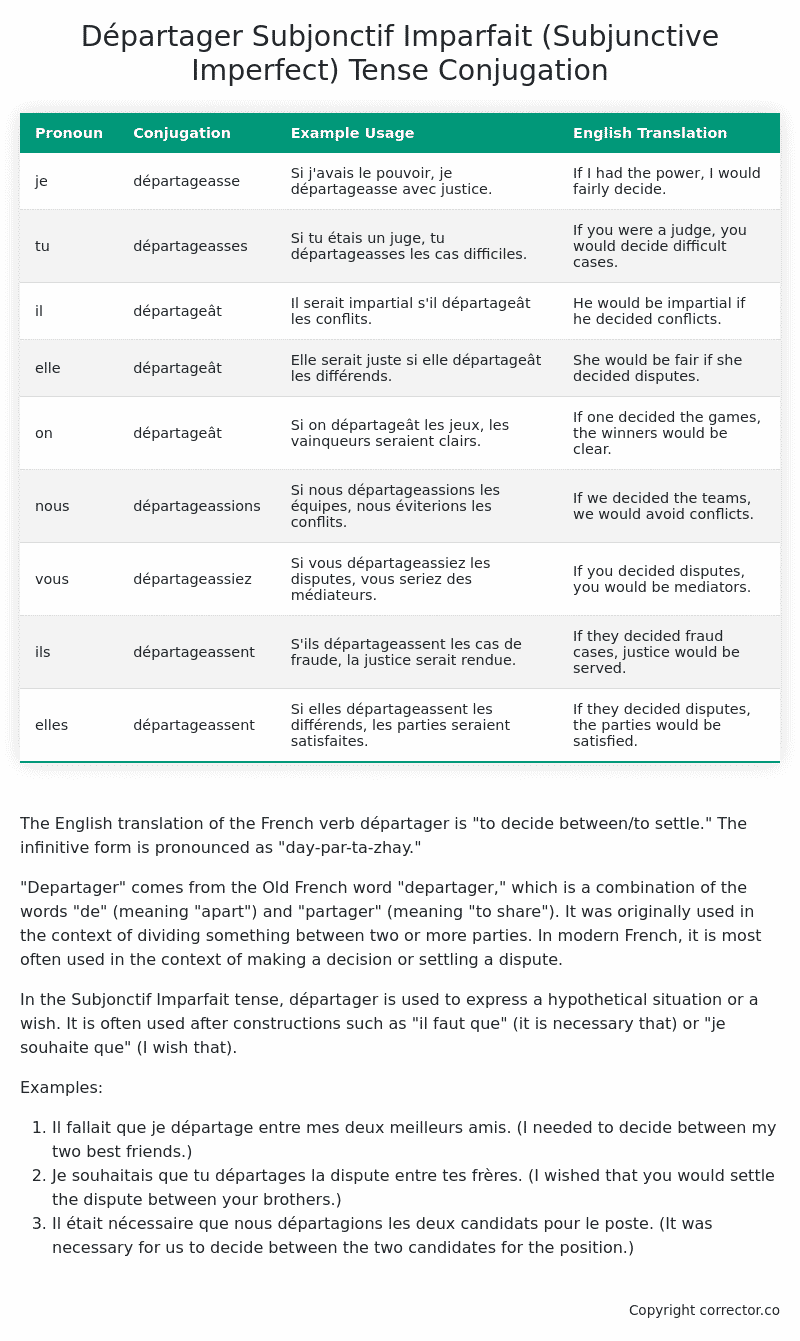Subjonctif Imparfait (Subjunctive Imperfect) Tense Conjugation of the French Verb départager
Introduction to the verb départager
The English translation of the French verb départager is “to decide between/to settle.” The infinitive form is pronounced as “day-par-ta-zhay.”
“Departager” comes from the Old French word “departager,” which is a combination of the words “de” (meaning “apart”) and “partager” (meaning “to share”). It was originally used in the context of dividing something between two or more parties. In modern French, it is most often used in the context of making a decision or settling a dispute.
In the Subjonctif Imparfait tense, départager is used to express a hypothetical situation or a wish. It is often used after constructions such as “il faut que” (it is necessary that) or “je souhaite que” (I wish that).
Examples:
- Il fallait que je départage entre mes deux meilleurs amis. (I needed to decide between my two best friends.)
- Je souhaitais que tu départages la dispute entre tes frères. (I wished that you would settle the dispute between your brothers.)
- Il était nécessaire que nous départagions les deux candidats pour le poste. (It was necessary for us to decide between the two candidates for the position.)
Table of the Subjonctif Imparfait (Subjunctive Imperfect) Tense Conjugation of départager
| Pronoun | Conjugation | Example Usage | English Translation |
|---|---|---|---|
| je | départageasse | Si j’avais le pouvoir, je départageasse avec justice. | If I had the power, I would fairly decide. |
| tu | départageasses | Si tu étais un juge, tu départageasses les cas difficiles. | If you were a judge, you would decide difficult cases. |
| il | départageât | Il serait impartial s’il départageât les conflits. | He would be impartial if he decided conflicts. |
| elle | départageât | Elle serait juste si elle départageât les différends. | She would be fair if she decided disputes. |
| on | départageât | Si on départageât les jeux, les vainqueurs seraient clairs. | If one decided the games, the winners would be clear. |
| nous | départageassions | Si nous départageassions les équipes, nous éviterions les conflits. | If we decided the teams, we would avoid conflicts. |
| vous | départageassiez | Si vous départageassiez les disputes, vous seriez des médiateurs. | If you decided disputes, you would be mediators. |
| ils | départageassent | S’ils départageassent les cas de fraude, la justice serait rendue. | If they decided fraud cases, justice would be served. |
| elles | départageassent | Si elles départageassent les différends, les parties seraient satisfaites. | If they decided disputes, the parties would be satisfied. |
Other Conjugations for Départager.
Le Present (Present Tense) Conjugation of the French Verb départager
Imparfait (Imperfect) Tense Conjugation of the French Verb départager
Passé Simple (Simple Past) Tense Conjugation of the French Verb départager
Passé Composé (Present Perfect) Tense Conjugation of the French Verb départager
Futur Simple (Simple Future) Tense Conjugation of the French Verb départager
Futur Proche (Near Future) Tense Conjugation of the French Verb départager
Plus-que-parfait (Pluperfect) Tense Conjugation of the French Verb départager
Passé Antérieur (Past Anterior) Tense Conjugation of the French Verb départager
Futur Antérieur (Future Anterior) Tense Conjugation of the French Verb départager
Subjonctif Présent (Subjunctive Present) Tense Conjugation of the French Verb départager
Subjonctif Passé (Subjunctive Past) Tense Conjugation of the French Verb départager
Subjonctif Imparfait (Subjunctive Imperfect) Tense Conjugation of the French Verb départager (this article)
Subjonctif Plus-que-parfait (Subjunctive Pluperfect) Tense Conjugation of the French Verb départager
Conditionnel Présent (Conditional Present) Tense Conjugation of the French Verb départager
Conditionnel Passé (Conditional Past) Tense Conjugation of the French Verb départager
L’impératif Présent (Imperative Present) Tense Conjugation of the French Verb départager
L’infinitif Présent (Infinitive Present) Tense Conjugation of the French Verb départager
Struggling with French verbs or the language in general? Why not use our free French Grammar Checker – no registration required!
Get a FREE Download Study Sheet of this Conjugation 🔥
Simply right click the image below, click “save image” and get your free reference for the départager Subjonctif Imparfait tense conjugation!

Départager – About the French Subjonctif Imparfait (Subjunctive Imperfect) Tense
Formation
Common Everyday Usage Patterns
Interactions with Other Tenses
Subjonctif Présent
Indicatif Passé Composé
Conditional
Conditional Perfect
Summary
I hope you enjoyed this article on the verb départager. Still in a learning mood? Check out another TOTALLY random French verb conjugation!


